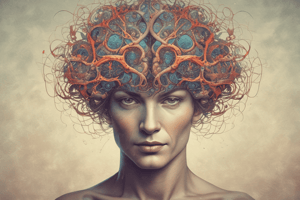Podcast
Questions and Answers
Which sociological perspective emphasizes the interdependent parts of society and their functions?
Which sociological perspective emphasizes the interdependent parts of society and their functions?
- Symbolic interactionism
- Structural functionalism (correct)
- Conflict theory
- Exchange theory
If a child raised in isolation develops their own language, which concept would this contradict?
If a child raised in isolation develops their own language, which concept would this contradict?
- Biological inheritance of language
- The looking-glass self
- The importance of socialization (correct)
- The role of education
What is the primary difference between social change and social control?
What is the primary difference between social change and social control?
- Social change focuses on individual behavior, while social control focuses on group behavior.
- Social change involves alterations to societal structure, while social control aims to maintain the existing structure. (correct)
- Social change is short-term, while social control is long-term.
- Social change is always positive, while social control is always negative.
Values influence behavior, but what role do they play in forming personal judgments?
Values influence behavior, but what role do they play in forming personal judgments?
How does deviance contribute to social change?
How does deviance contribute to social change?
What distinguishes mores from folkways?
What distinguishes mores from folkways?
When cultural diffusion occurs, what is the most likely outcome?
When cultural diffusion occurs, what is the most likely outcome?
How does endogamy maintain social boundaries?
How does endogamy maintain social boundaries?
How does an estate system of stratification differ from a class system?
How does an estate system of stratification differ from a class system?
According to the Dowry Prohibition Act, 1961, what is the consequence of demanding dowry?
According to the Dowry Prohibition Act, 1961, what is the consequence of demanding dowry?
Flashcards
Social physiology
Social physiology
Deals with interactions, social laws and dynamic aspects of society.
Social Change
Social Change
Alterations in the structure and functioning of society over time.
Socialization
Socialization
The process of development through acquiring values, beliefs and expectations.
Values
Values
Signup and view all the flashcards
Deviance
Deviance
Signup and view all the flashcards
Culture
Culture
Signup and view all the flashcards
Endogamy
Endogamy
Signup and view all the flashcards
Caste System
Caste System
Signup and view all the flashcards
Stratification System
Stratification System
Signup and view all the flashcards
Shudras
Shudras
Signup and view all the flashcards
Study Notes
- Social physiology involves the interactions within society.
- A structural view of society was proposed by Cooley.
- Sociology originates from the words Socius and logos.
- Socialization centers around the matter of learning.
- Social change refers to alterations in a society's structure and function over time.
- Secondary socialization occurs in schools.
- Socialization involves acquiring values, beliefs, and expectations.
- Values guide behavior and judgment, but are not unimportant parts of culture.
- Non-conformity to social norms is deviance.
- Mores are traditions.
- Established modes of thought and action are defined as culture.
- Cultural diffusion involves the spread of cultural practices.
- Marriage within one's own group is known as endogamy.
- The caste system is stratification whereby a person's right and rank in society is determined by his or her birth.
- A person's social status is determined by income, education, and occupation.
- Shudras are at the bottom of the Hindu caste system.
- The Dowry Prohibition Act of 1961 sets punishment for giving, taking, demanding, or accepting dowry as up to six months imprisonment and or up to five thousand rupees fine.
- The Indian government acknowledged the significance of promoting social services to raise living standards in the Third Five-Year Plan.
- Article 17 of the constitution abolishes untouchability.
- A juvenile delinquent is a minor who has participated in an illegal act.
- Bullying is an example of psychological abuse.
- The current lowest legal voting age in the world is 16.
- The term 'Sociology' was coined in 1839.
- Social stratification is based on social injustice.
Studying That Suits You
Use AI to generate personalized quizzes and flashcards to suit your learning preferences.




